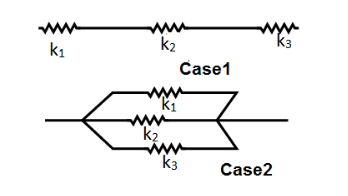Question
Question: A spring of force constant \( k \) is cut into lengths of ratio \( 1:2:3 \) . They are connected in ...
A spring of force constant k is cut into lengths of ratio 1:2:3 . They are connected in series and the new force constant is k′ . Then they are connected in parallel and the force constant is k′′ . Then k′:k′′ is:
(A)1:14 (B)1:6 (C)1:9 (D)1:11
Solution
Hint : In order to solve this question, we are going to first let the three constants in which the cut spring is divided and draw a diagram to depict the situation. Then, by using the parallel and the series combination for the three parts of the spring and finding k′ and k′′ , we can compute their ratio.
For a series combination of three springs of force constants k1 , k2 k3 ,
k′1=k11+k21+k31
For a parallel combination,
k1+k2+k3
Complete Step By Step Answer:
Let k1 , k2 k3 be the spring constants of the new springs so obtained after the spring with constant k is cut.

As the spring is cut in the lengths of the ratio 1:2:3 , so the spring constant of each part is the ratio part times k . Now, in the series combination, we have, the spring constant k′ obtained as:
k′1=k1+2k1+3k1
Solving this equation, we get
\dfrac{1}{{k'}} = \dfrac{{6 + 3 + 2}}{{6k}} = \dfrac{{11}}{{6k}} \\\
\Rightarrow k' = \dfrac{{6k}}{{11}} \\\
For the spring parts connected in the parallel, the spring constants are added directly to get the equivalent spring constant.
Thus, the spring constant k′′ can be obtained as:
k′′=k+2k+3k=6k
Thus, the ratio of the equivalent spring constants k′:k′′ can be obtained as:
k′:k′′=116k:6k=1:11
Hence the equivalent force constant for the parallel combination is 11 times the spring constant for the series combination.
Thus, option (D)1:11 is the correct answer.
Note :
Two or more springs are said to be in series when they are connected end-to-end or point to point, and it is said to be in parallel when they are connected side-by-side; in both cases, so as to act as a single spring. Remember that in series combination, the spring constant always decreases for the spring.
